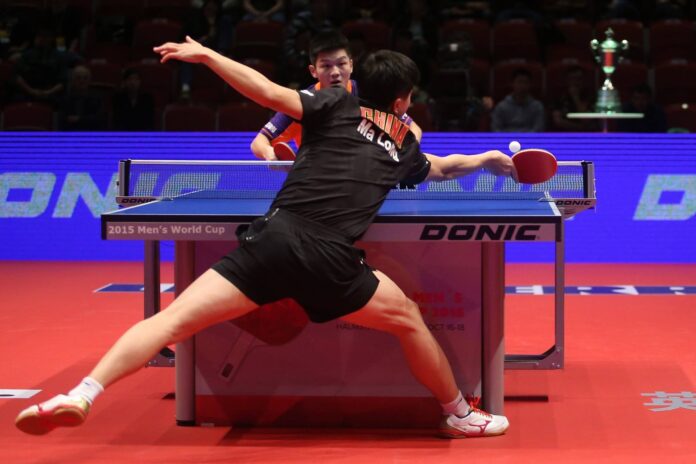In his book “The Art of War,” Sun Tzu said:
“what enables the wise sovereign and the good general to strike and conquer, and achieve things beyond the reach of ordinary men, is FOREKNOWLEDGE.
Now this foreknowledge cannot be elicited from spirits; it cannot be obtained inductively from experience nor by any deductive calculation.
Knowledge of the enemy’s dispositions can only be obtained from other men.”
You can start out learning in a group class or following someone on YouTube, but at some point, you need a coach or teacher. We all need teachers, coaches, and mentors to reveal our blind spots. This reminds me of a story.
When I was in grade 3, I remember going to school and seeing kids playing table tennis for the first time. I was fascinated and told my father about it. We had construction going on at my house, and he took a sheet of 8×4 plyboard on some horses, and we would play every Sunday after church. I learned quite a few tricks playing with my dad.
I entered the school competition, which had over 64 amateur contestants. There were six rounds in the playoffs I and I won the finals. I felt both confident and pleased, so I decided to try my new skills in a drop-in club competition. I was beaten soundly by much more technically trained players.
I tried every type of service that worked so well on amateur players. I tried my long fast serves. I tried my high spin sidespin serves. Let say these players sent each of my serves packing home. These players looked different in their technique, their footwork, and their serves. I will never forget how humbling that experience was.
Fast forward 30 years. In September, JPMChase Employee appreciation week at Iron Hill hosts a table tennis competition, and some colleges asked me if I played. I went to see the games. I was not impressed watching our amateurs play until I saw Shah get on the board. He had all the players’ techniques that crushed me many years before: the footwork, the serves, the pin point placements on the board. Shah had my respect and rekindled a fire that lay dormant inside me. I later learned that he is a top 5000 US-ranked player, one of the best in the field.
I hit it off with Shah, and we connected in a safe space of psychological safety and trust for dialogue. I wanted to learn, and in December, I asked him if he would mentor and coach me in Table Tennis, and he said SURE.
When I saw him in January, and I recall our first session. I did not have a plan, but neither did Shah. So we decided to play, and he said, “Here’s your first lesson, bend your legs and get down so you can see the ball’s path.” Coaching is feedback at the moment, not months after at a checkpoint if that ever happens.
Shah is about half my age, and this dynamic made him a great coach. He was humble and open to being coached. He acknowledges that there is much to learn and is willing to give up control. What has always fascinated me about Shah is his curiosity. he would often say, “let me ask you a question or Answer me this.” What makes Shah great isn’t his advice but, instead, his thoughtful nature, natural curiosity, and ability to listen. You aren’t coaching if you do all the talking; listen carefully.
What counts in coaching isn’t outcomes; it’s the coaching processes themselves. While I enjoyed our first session, I did not want to waste Shah’s time or mine, so I created my coaching plan – the opportunity of my current state, my desired state, and ideas that I wanted to learn to get there.
Coaching works best when your protege – the “Talent” – sets the agenda. Don’t expect to find a coach who will give you perfect, sage-like wisdom and create a structure for you. At this stage, we went over not just “the how but also the why of each step.” Each person is unique. Adapt your plans accordingly.
Become a self-starter and don’t rely on outside motivation. Parents teach self-discipline, hard work, and constructive use of time. In the next stage of development comes deliberate practice, in which practice becomes work, and students get coaches or teachers.
The first thing I wanted to understand was spin. I wanted to know what spin did in attack and defense. I wanted to know how to stroke the ball to generate this spin. Shah showed me all the specifics of spin using the ball, and the racket Generalities and summaries don’t contribute to helpful coaching conversations.
I have seen players attacking my backhand, so I created a 3-month plan to develop a backhand similar to Shah. On day one, I looked like a disaster. Shah encouraged, saying, “Although I was not getting it on the board, I was hitting it with confidence.” Feedback is essential, and getting a coach gives more feedback and better quality feedback.
Shah implicitly knew that emotion infuses every action and decision, and coaching requires it. You are likely to achieve impressive results when they operate with ambitious, “stretch” goals – aiming for higher performance levels but in the context of a supportive environment. People development needs a judge, a teacher, and an encourager.
it is not practice that makes you perfect: Add one word, it is PERFECT practice that makes you perfect: to go to the top, you need a great coach and iron-clad determination and daily routine: practice loyalty, correct wrongs when you see them and continuously get feedback.
Very soon, I was easily beating amateur players at our job. I was one of the players who would instill fear in other players to the point where some might leave the room when I entered. I was a favorite to win the upcoming JPMChase Employee appreciation week contest. The other finalist told me that I had an 80% chance to win. I think he was gaslighting me 🙂
I got to the finals and was defeated. The truth is I lost the game. I do not think he beat me using his strategy, but I threw away my own game. I felt some sense of shame and humility. I could barely look people in the eye.
Remember, failures are part of your attempt to immerse yourself in continuous improvement.
Remember, Reflect on your losses, so you learn from your failures.
Remember to discuss them with your coach.
Shah was generous, vulnerable, and intellectual. As a great coach, he expects some degree of failure and understands why you must pause before offering advice. Shah knew that the point was to give worthy guidance.
We need a coach when we face doubt, uncertainty, fear, and hardships. We need help. We cannot go it alone. We need help to push past the brink of giving up to face the supreme ordeal again and slay the dragon.
What naturally developed between Shah and myself was the fundamentals of coaching – building a relationship, having clear goals, providing both encouragement and correction—supporting each other no matter the outcome of competitions but taking them as grown experiences and getting back to work.
I went on to WIN the contest the following year in epic style, coming from a 9/3 deficit to claim victory in the semi-finals and winning the finals beating the opponent 1/11 in the second game. Best of all, Shah was there to witness and record the final for me.
Summary
Use 80% connection and 20% coaching
When choosing a coach, the question is not “is this person a good coach” but “what coach is best FOR YOU.” Someone who makes relationships and reinforces knowledge. Find good coaches to take you to the next level, ones that make you think bigger.
A two-way relationship
“Coach,” motivates, engages, inspires, and teaches. Your Coach should arise naturally, beyond the initial meeting, maintain the connection, and make yourself useful to the person to foster a two-way relationship.
A coach inspires and engages people in various ways, including close collaboration, creative thinking, and emotional connection.
Quality coaching adheres to three principles: “Be lazy, be curious,” and “be often.” When you are lazy, you listen instead of jumping in instantly to give advice.
The golden rule of coaching: Place your protege interests above your own.
Coach because you want to help others, not because you want them to perform better for you. You’re not competing with those you coach. As a coach, your most significant responsibility and privilege are to help others go farther than you have. One proof of your effectiveness as a coach unfolds when your protege becomes as successful or even more successful than you.
Ultimately, the test of any coach’s success is visibly higher performance and accelerated development in those being coached.











